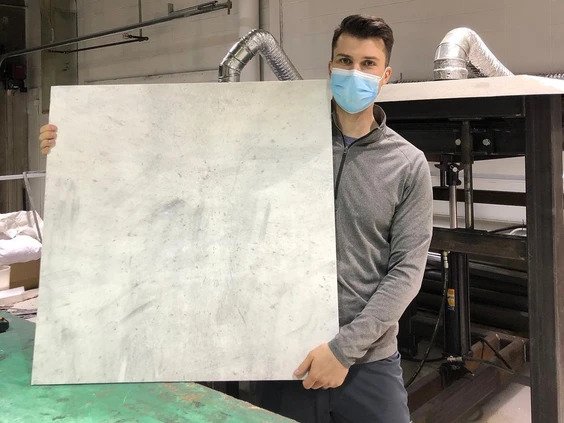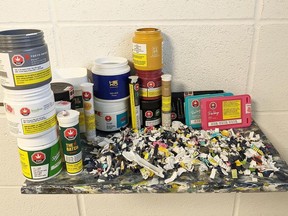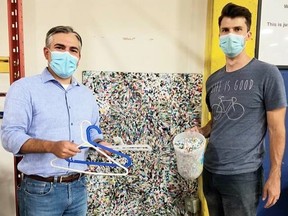You are here
Home 🌿 Recreational Marijuana News 🌿 Meet the Edmonton man transforming pot containers into useful products 🌿Meet the Edmonton man transforming pot containers into useful products

Corey Saban is rethinking plastic waste in the cannabis industry
During the pandemic, Corey Saban started a recycling company out of his garage with a kitchen girdle, a steam iron and a whole bunch of plastic waste.
Laid off from his construction job and suddenly spending lots of time at home, the Edmonton-based father of three was surprised at how much single-use plastic his family was using.
So he started tinkering in the garage. He began by transforming plastic bags into coasters. Then he purchased some small pieces of equipment and started creating hexagonal tiles that could be used to create wall protectors.
Soon after, the new business had a name, [Re] Waste, and landed its first project. Saban pitched a recycling pilot to the city of Beaumont, located just outside of Edmonton, focused on finding the most effective ways to divert the city’s residential plastic waste stream.
After that project got some media attention, the cannabis industry started calling.
Saban has now partnered with two of Canada’s leading cannabis retailers in Nova Cannabis, the parent company of Value Buds, and High Tide, the parent company of Canna Cabana.
When Value Buds approached him, Saban said he was honest about the state of the business.
“I said, we’re still working out of the garage, it’s literally me, but if we can put a program together that works for you guys, then absolutely, let’s look at something.”
That conversation eventually led to [Re] Waste securing a contract with the retailer, allowing the company to move out of the garage and into a small facility in Edmonton. [RE] Waste now has four full-time employees including a plastic technician, an operations manager and a production manager.
Consumers vote with their dollars
In cannabis, Saban says it’s the consumers who are driving recycling and take-back programs.
“It’s the customers wanting the cannabis industry to handle their waste better,” he says. “There’s a demand from the customers and we’re all starting to see how customers vote with their dollars.”
Earlier this month, Trivium Packaging released its 2022 Global Buying Green Report, which is based on survey data from more than 15,000 consumers across Europe, North America, and South America on their values and behaviours related to sustainable packaging.
It found that — among consumers under 45 — 86 per cent are willing to pay more for sustainable packaging, a 3 per cent increase from last year’s survey. It also found that nearly 75 per cent of consumers would be interested in buying products that come in reusable packaging.
That’s where [RE] Waste comes in.
The company works with cannabis retailers to develop customized collection programs and then creates products, everything from consumption accessories to display cases, from recycled plastic waste. This month, the company is launching collection bins for cannabis retailers that are made out of roughly 600 cannabis containers and lids.
![[RE] Waste’s Canna Bins are made entirely from plastic cannabis packaging.](https://smartcdn.gprod.postmedia.digital/thegrowthop/wp-content/uploads/2022/04/thumbnail_PXL_20220407_223815490-Cropped.jpg?quality=90&strip=all&w=288)
With each of its clients, the goal is the same — to create functional products for their operations from reclaimed plastic or divert it to other end markets for reuse.
The collection programs are a subscription model, with retailers paying a monthly fee to have [RE] Waste’s collection bins placed in their stores. Once a month the plastic is shipped back to [Re] Waste, the monthly subscription fees cover the shipping costs, or the company comes right to the retailer to pick it up. Bins have been placed in 203 retail stores across Canada.
From there, [RE] Waste weighs the box and provides a monthly sustainability report for each retailer letting them know how much plastic they’ve diverted from the landfill. The plastic is then sorted, de-labelled, cleaned and shredded for manufacturing.
Long-maligned for excessive and wasteful packaging, it’s estimated the Canadian cannabis industry generated 6.4 million kilograms of plastic packaging waste in the first year of legalization.
Part of the issue, Saban says, is cannabis plastics have little value.
In conversations with the City of Edmonton, the City of Calgary and a number of plastic processors, Saban says he learned it’s the combination of low-grade plastic, mixed materials and hard-to-remove labels that leads to so many cannabis containers ending up in landfills.
“Material recovery facilities will only sort the plastic or that material that they’ll get paid for,” he says.
“Nobody wants to spend time collecting this low-grade material that doesn’t have an end market.”
‘We wanted to be a part of the solution’
For Edmonton-based Nova Cannabis, which owns or operates 78 locations across Alberta, Ontario, and Saskatchewan, primarily under its Value Buds banner, striking a deal with the local company just made sense.
“We wanted to be a part of their initiative, which aligns with our purpose-driven values,” Marcie Kiziak, CEO of Nova, told The GrowthOp in an email.
“We got in touch and worked with Corey to come up with a collection solution for our growing network of retail locations.”
Since they began working together, [RE] Waste has collected more than 100,000 containers from 78 Value Buds locations, weighing roughly 2,700 kilograms.
Kiziak says plans are in the works to launch consumption accessories that will be made from recycled cannabis containers collected from Value Buds stores. The company is also set to begin manufacturing a recycled cannabis container, which will be the first ‘full circle’ recycled plastic accessory to be sold in its stores.

“We’re looking forward to eventually seeing these plastic empties made into something we think people will be excited to use and keep,” Kiziak says.
She adds that the work [RE] Waste is doing is not just valuable to the company but the “cannabis industry in general and to the consumer who has long been frustrated with excessive cannabis packaging waste.”
“We saw the significant amount of plastic waste being produced by cannabis packaging in the industry and we wanted to be a part of the solution,” she says.
Applications beyond cannabis
Beyond the cannabis industry, [RE] Waste also works in the beauty industry, food service, and they continue to engage with municipalities about plastic waste diversion efforts.
“If you look at any business, there’s going to be some level of plastic waste,” Saban says.
“For us, it’s just about setting up a collection program that allows us to capture that plastic as efficiently as possible, and then figuring out the logistics on how to get that back to [RE] Waste.”
Beyond the four full-time employees, [RE] Waste has also partnered with the Goodwill Industries of Alberta on a career connection program. On Wednesdays and Fridays, four career connection employees work at the company’s facility.

[RE] Waste works with Goodwill, which produces 25-30 tonnes of granulated plastic per year, on a manufacturing program to repurpose their recycled plastic flakes into products, such as building materials like wall protection and countertops.
By partnering with Goodwill, [RE] Waste has been able to create a circular economy within the organization, says Mortimer Capriles, director of sustainability and innovation with Goodwill Industries of Alberta.
“What Corey’s doing is amazing. I’ve watched him grow as an entrepreneur and do so much of it on his own,” Capriles says.
“The world needs more people like him to help address our addiction to plastic.”
420 Intel is Your Source for Marijuana News
420 Intel Canada is your leading news source for the Canadian cannabis industry. Get the latest updates on Canadian cannabis stocks and developments on how Canada continues to be a major player in the worldwide recreational and medical cannabis industry.
420 Intel Canada is the Canadian Industry news outlet that will keep you updated on how these Canadian developments in recreational and medical marijuana will impact the country and the world. Our commitment is to bring you the most important cannabis news stories from across Canada every day of the week.
Marijuana industry news is a constant endeavor with new developments each day. For marijuana news across the True North, 420 Intel Canada promises to bring you quality, Canadian, cannabis industry news.
You can get 420 Intel news delivered directly to your inbox by signing up for our daily marijuana news, ensuring you’re always kept up to date on the ever-changing cannabis industry. To stay even better informed about marijuana legalization news follow us on Twitter, Facebook and LinkedIn.




